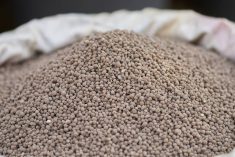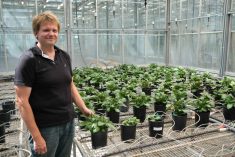It’s estimated that 90 per cent of global wheat varieties are at risk of contracting a devastating stem rust disease, Ug99. Discovered in Uganda in 1999, it has already affected crops from Africa to Western Asia – and it’s spreading.
While the disease hasn’t reached North America yet, a team of Agriculture and Agri-Food Canada (AAFC) scientists have made a breakthrough discovery in the international effort to control the disease by identifying and isolating three new genes with high levels of resistance not previously used in wheat breeding.
Read Also

Aster leafhoppers: An unwanted guest migrating from U.S. for canola
Research scientist talks about the prevalence of aster yellows in canola in Alberta, with testing on its pest carriers and conditions in which it affects yields.
Tom Fetch, who leads the AAFC team, said many wheat varieties across the globe became susceptible because they only contained one gene with resistance that was overcome by Ug99. “The goal is to use genes in combination to create a multi-gene stack of resistance,” he said.
In the past year, AAFC has sent seed of the resistant Canadian varieties to wheat breeders in the United States and the International Maize and Wheat Improvement Center (CIMMYT) to develop improved local varieties in affected areas and in developing countries that are most at risk.
This research goes beyond enhancing the security and protection of Canada’s food supply; international collaboration like this will help meet the global challenge of doubling food production over the next 40 years to meet the demands of a growing population.
The discovery of the genes marks a huge step in controlling Ug99 and is a significant return on investment. The Government of Canada committed $13 million in 2009 to reduce the vulnerability of Canadian farmers to stem rust diseases of wheat.
Since then, AAFC scientists have identified resistance in Canadian wheat lines, but also ensured new varieties have at least two effective resistance genes, and collaborated with an international effort on all aspects of wheat rust research – from pathology to variety development and distribution.
AAFC is one of 23 prominent research organizations around the world participating in the Durable Rust Resistance in Wheat project.














